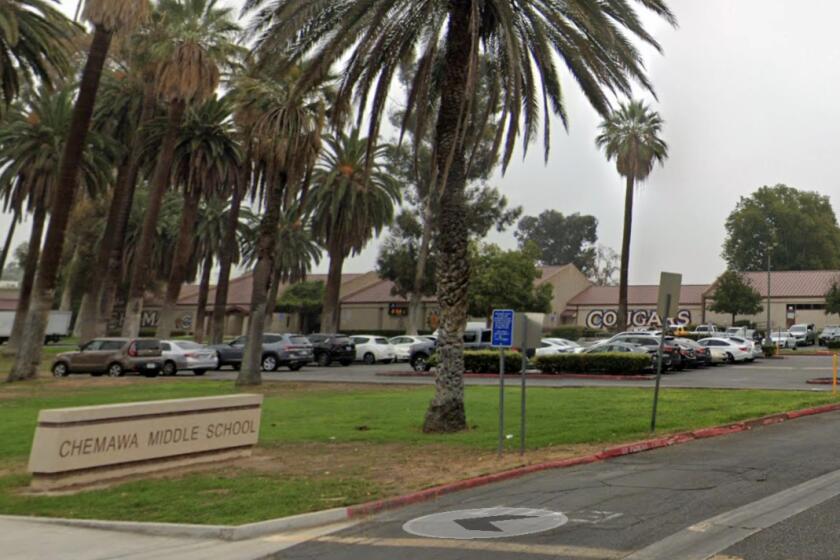Financial Empowerment a Mixed Bag for Principals
At Vista del Mar School, Principal Jim Sieger races the clock 11 hours a day -- rushing to meetings, scrambling to classrooms, dealing with discipline problems. If there is one thing Sieger needs more of at the 950-student campus in San Clemente, it’s time.
That’s why he is reluctant to embrace a new proposal by California Education Secretary Richard Riordan that would vastly expand principals’ powers over their budgets and staffing in the name of local control.
“I want to be working with teachers and students,” Sieger said. “I don’t want to be working with dollars and cents. I’m here to be the educational leader, not the general manager.”
Though some campus administrators welcome the opportunity to dictate their own spending and other policies, most of 15 principals interviewed last week around California said Riordan’s new approach to school management was flattering in theory but could prove counterproductive.
These principals, already facing strong pressures to raise test scores, voiced fears that overseeing multimillion-dollar budgets would divert them from the very goal Riordan has in mind: improving student achievement.
“It’s already complicated and stressful as it is,” said Dorothy Wiggins, principal of Cole Middle School in Oakland, whose days are often bogged down attending to personnel issues, student discipline, legal paperwork and student records. “When we start talking about taking full autonomy, we also have to talk about what that means [for] services we’re giving to students.”
Many principals rely on their central offices to handle bureaucratic minutia, and say they don’t have the time to pay utility bills or interview contractors. They also acknowledge that they lack the financial savvy to oversee big budgets.
“I’m not an MBA. I’m not a CPA. I can barely balance my checkbook,” said Sieger, who has 18 years of administrative experience and now runs the K-8 campus in San Clemente. “To all of a sudden say to me, ‘Here’s another $10 million, worry about your maintenance and repairs,’ I would say no thank you.”
Riordan said in an interview that principals could easily learn the necessary budgeting and finance skills in summer courses. And he adds that he expects any major reform to face resistance.
Giving principals more control over their schools would make the job more appealing, he believes, adding that “weak principals” who aren’t up to the task would leave on their own or be replaced. “Right now, being a principal is very unattractive,” he said. “There’s no power [or] authority.”
Principal Norm Morrow of Jefferson High School in South Los Angeles sees merit in Riordan’s ideas. The principal, whose students are primarily from low-income and Latino families, said that operations sometimes get bogged down in a huge and bureaucratic system like the Los Angeles Unified School District.
He said he would willingly take on the extra work of managing his school’s budget, even though he already spends up to 80 hours a week on the job.
“If you’re going to hold me responsible for everything, then let me have the decision-making power,” Morrow said. “After all, it’s my neck on the block, nobody else’s.”
When he was mayor of Los Angeles, Riordan spent a great deal of time trying to reform the city schools by supporting candidates for the Board of Education. He also helped push for a local control program known as LEARN, which brought teachers, administrators and parents together on school governing councils. It went into decline a few years ago.
Now, as education secretary, he wants to empower principals as part of a wider plan to change funding and management of California’s 8,000 public schools.
Riordan also wants to streamline financing so that state money follows students to schools rather than being allocated by central districts. The idea is to cut bureaucracy and generate more money for schools, especially those in low-income areas.
Though Riordan has fleshed out his proposal on principals, details of his school-funding system remain vague. Both would need to be hammered out by the state Legislature this year, and could face opposition from teacher and administrator organizations and other groups.
Union leaders and others who keep tabs on labor relations say Riordan’s plan could require a wholesale change in teachers’ contracts and also in state bargaining law -- something that teachers unions are likely to fight.
“We’re not interested in the idea of having entrepreneurial principals,” said John Perez, president of the Los Angeles teachers union. “The collective wisdom of teachers is better than the collective wisdom of one principal. We will undoubtedly oppose it.”
Riordan stresses that principals would not be allowed to become dictators, and would be expected to consult with teachers on their assignments and with parents and community members on other issues.
Of the collective bargaining agreements, he said: “None of those were written on Mt. Sinai. You’ve got to set up what is the ideal way to do something for the kids ... and then figure out how to get there.”
According to an early draft of Riordan’s plan, obtained by The Times, each principal would act as a “general manager,” with authority to determine the number of teachers and to appoint assistant principals and other positions. Principals would be required, along with their teachers, to submit an annual plan to their district superintendent each year on the budget, school schedule, student achievement goals and other elements of school operations.
Principal Ida Randall of McKinley Magnet School in Bakersfield likes what she has heard about Riordan’s ideas. She said that central offices were “out of touch” with what goes on at schools, often issuing blanket guidelines that don’t suit individual campuses.
Instead, she would like to see the central office provide support and training without handing down unnecessary mandates. Randall said that would free her to make better choices for her K-6 school.
“I would be able to decide where to purchase items at places that are cheaper, rather than vendors used by district,” she said. “I would be able to interview, hire and select people at a faster rate.”
But many of Randall’s colleagues disagree.
Principal Dale Kinnear of North High School in Riverside said that central administrators were better equipped to oversee certain functions, such as school maintenance and food services, because schools did not have adequate staffing to handle the job.
“Do I want to overhaul the system so that all those responsibilities fall on my shoulders? No,” Kinnear said. “That would be a drastic mistake.”
Principal John Rabe of Mission Avenue Open School in suburban Sacramento said that his school, like others in California, already controls some money intended for low-income students and gifted students, two groups that require extra resources. However, he doesn’t want to worry about paying his school’s phone bill or utility bills.
“It would turn me into a true bureaucrat, and would strip me of my opportunities to be a true educational leader,” he said.
Some educators question why the state would pursue a new round of reforms, even ones that empower principals, when current policies that have centralized power in many big districts seem to be pushing test scores up, especially in the elementary grades.
“Centalization has created some stability. People know what’s expected of them,” said Priscilla Wohlstetter, director of the Center on Educational Governance at USC. “We have a track record where centralization has worked. Why would you uniformly wipe it out?”
Many principals agree.
“Everybody is looking for the silver bullet,” said Principal Larry Misel of Agoura High School. “What we need to do is stick with what is working.”
More to Read
Sign up for Essential California
The most important California stories and recommendations in your inbox every morning.
You may occasionally receive promotional content from the Los Angeles Times.










